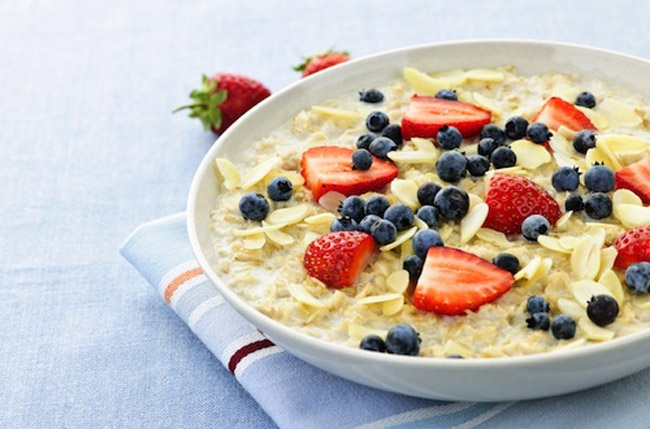|
|
Nutrition and Multiple Sclerosis

Multiple sclerosis (MS) is a chronic degenerative inflammatory neurological
disease that affects the brain and spinal cord. Dietary recommendations for
people with MS are similar to those for the general population. Recommendations
are based on the
Food Guide Pyramid .
TAKE PLENTY OF
-
Whole grains, like bran, whole-wheat flour, whole cornmeal, wheat bran
cereals (All Bran, Bran Buds, Bran Chex), bran flakes (Raisin Bran),
Grape-Nuts, or Shredded Wheat, for energy.
-
Cooked green leafy vegetables and fresh fruit, for
fibre and energy
-
Adequate fluid intake, preferably
water - six to eight 8-ounce glasses per day, to
avoid constipation.
-
Polyunsaturated fats
from oily fish and sunflower, safflower, corn and soya oils.
-
Dried fruits such as raisins, prunes, or figs.
Cut down on
Avoid
|
|
-
Make a variety of of grains, fruits, and vegetables the foundation
to your diet plan. Whole grains�such as whole wheat, brown rice, oats and
whole grain corn�provide a fiber boost to the carbohydrates in your diet

-
When
it comes to fruits and vegetables,les, enjoy five a day�at least three
servings of vegetables and two servings of fruit. It doesn�t take much to
make a serving�just one cup of raw leafy vegetables, a half-cup of other
vegetables or fruit, or six ounces of fruit juice. Choose dark-green leafy
vegetables and brightly colored fruits and vegetables often.
-
Next add low-fat choices from the
protein and
dairy level of the pyramid to the nutritional groundwork you have laid. This
includes lean meats, fish and poultry, low-fat or non-fat dairy products,
dried beans, tofu, and other plant sources of protein.
-
Individuals with MS should follow the American Heart Association
guidelines on fat intake:
-
30% of total calories should come from fat
-
7%-10% saturated fat sources
-
10% polyunsaturated fat sources
-
10% monounsaturated fat sources
Some studies on the possible benefits of the omega-6 and omega-3
essential fatty acids , used in the maintenance and repair of the central
nervous system, have suggested that supplements might slow the progress of
the disease and reduce the severity and duration of relapses, the effect is
modest and is still undergoing investigation.
One of the diets that has received a lot of attention is the the low-fat diet
of Professor Roy Swank of Portland, Oregon, USA. He claims that patients
following a diet low in saturated fats less than 20g ( 3/4 oz )per day - and
high in polyunsaturated fats had less frequent relapses, more energy and an
increased life expectancy. Although its specific effects on MS remain to be
proved, the Swank diet is at least a well-balanced one, in line with current
recommendations on reducing intake of saturated fats and cholesterol, and is
unlikely to pose any nutritional risks to MS sufferers.
-
It�s OK to enjoy sweets occasionally. But don�t let soft drinks or
sweets crowd out important foods you need.
-
To lower salt or sodium intake experiment with low-sodium condiments,
herbs, spices, and seasonings.
-
Make water and decaffeinated beverages your first choice.
-
Start with the easy changes. Then, one by one, add more kinds of
vegetables, reduce
portion sizes, introduce more low-fat foods.
Meals that are high in complex carbohydrates can
help to overcome the chronic tiredness associated with
MS.
|
|

Feeding your special needs
The main role of diet in MS is to enable people to manage common problems which
include fatigue,
incontinence
and constipation and to help them avoid exacerbating other symptoms. Chronic
fatigue is one of the most debilitating symptoms of MS. A nutritious, low-fat
breakfast and plenty of complex carbohydrates such as jacket potatoes and brown
rice at other meals will help energy levels throughout the day. This can also
help to keep eep weight under control as part of a
calorie-controlled diet. Excessive weight gain can be
a problem because of the decrease in energy expenditure associated with the
condition, especially if sufferers also come to depend on convenience foods that
are low in nutrients or eat too many 'comfort' foods which are often high in fat
and sugar.
Excessive weight gain can further impair mobility
and puts a strain on the respiratory and circulatory
systems, so it is important to control the intake of
calories while ensuring that the diet is well balanced
and provides a good intake of all nutrients.
|
|
As the disease progresses, swallowing problems may occur. Swallowing
problems may result in weight loss, malnutrition, dehydration, constipation,
loose dentures, reduced strength, tiredness, and loss of general well being.
Foods to avoid:
-
Mixed textured foods and liquids, i.e., vegetable soup.
-
Food that needs lots of chewing, i.e., caramel candy or taffy.
-
Stringy food, i.e., bacon or celery.
-
Hard, coarse food, i.e., nuts, toast, crackers, or chips.
-
Foods that can become sticky in the mouth, i.e., bread or lettuce.
-
Thicker drinks may not be appropriate, depending on the dysphasia.

Alcohol, incontinence and constipation
Alcohol
can be taken in moderation but some sufferers may find that it can temporarily
exacerbate MS symptoms such as problems with speech and coordination. More
importantly, it inhibits the vital conversion process of essential fatty acids,
increases the level of saturated fat in the blood and depletes the body's supply
of valuable nutrients. Smoking also depletes blood levels of vitamin C and can
worsen the symptoms of the disease.
MS often affects the nerve fibres of the bladder, causing incontinence. This can
indirectly affect the balance of the diet if sufferers severely restrict their
fluid intake, especially if they cut down on vitamin and mineral-rich milk and
fruit juices. Reducing fluid intake can often cause a dry mouth, which may lead
to a loss of appetite and difficulty in swallowing. Long-term incontinence can
also increase the risk of urinary tract infections such as Cystitis. Cranberry
juice can be effective in helping to avoid this.his.
Fluid restriction can contribute to the common problem of constipation,
especially when it is combined with decreased mobility and if the bowel is also
affected. Plenty of water-at least 1.7 litres ( 3 pints ) a day-and fibre-rich
foods such as whole grains, cooked green leafy vegetables and fresh fruit will
help to prevent constipation.
It is essential to remember that MS affects each individual differently and that
relapses and remissions also play a key role in determining a person's dietary
needs. People with MS should seek professional nutritional advice throughout the
course of their illness.
Related Links
|
|
|
|
|
|
|
|
|









